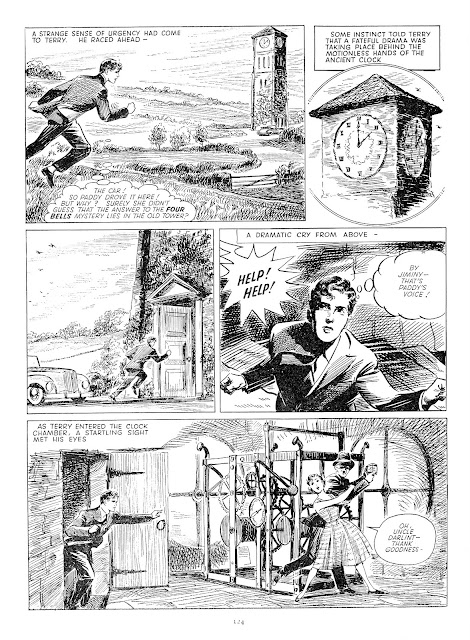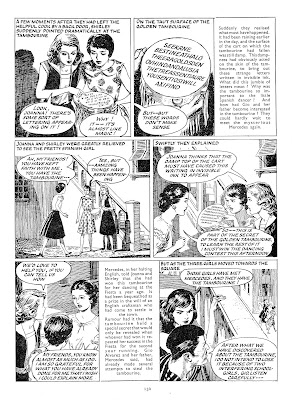Showing posts with label School Friend. Show all posts
Showing posts with label School Friend. Show all posts
Sunday, December 26, 2010
British Girls' Comics: School Friend Annual 1960 selection
This post revisits School Friend, this time sampling the 1960 annual. Examples of finely drawn realistic art abound, starting with this charming ballerina tale, "The Roses That Brought Romance". What reader could resist the allure of this celebrity world of European royalty, splendorous ballet performances, and intrigue in which the young girl saves the day!?
The next story is interesting from multiple points of view. There's a clandestine group of do-gooder girls operating at this private girls' school. These middle class agents of freedom assist a working class girl in achieving justice. In a world away from the oversight of the patriarchs, females can express their full potential, even be heroines. I have no idea whether or not the Silent Three was an ongoing series in the weekly comic, but it seems it would have made a good one:
In this next somewhat unlikely scenario, Tuckshop Trudy is a young female working at a private school for teenage boys with uncanny control over their hormones!
"Peril for Her Royal Pupil" exemplifies the tendency for these middle class girls' comics to locate their universe within the British Empire, even though by this time it was already a thing of the past. A kind of reprise to former days of glory. Simultaneously, however, a strong feminist message can be read from this tale of a teenage girl's ability to thwart adult male evildoers.
"The Riddle of the Four Bells" is a fairly lame mystery tale featuring detective Terry Brent and his assistant, Irish girl Paddy MacNaught. As with many of this type of girls' story, there's a stash of jewels as the prize.
Young British ladies on holiday in Spain. It's interesting here how the British girls on holiday aren't looking forward to going back home - the Spanish people seem so happy - and yet at the end there's the hint that maybe the Spanish dancer might be fortunate enough to go to Britain to dance. I suppose everyone thinks it is a treat to be able to travel outside their own country.
Thursday, October 28, 2010
British Girls' Comics: School Friend Annual 1959
School Friend was a British weekly girls' comic paper clearly aimed at an actual or aspiring middle and upper middle class audience. This one is the 1959 hardbound annual. The cover illustration says it all - would any school other than an upper crust private school be holding a regatta!!? It's all a jolly good show. The interior stories feature scenarios that working class British kids, certainly urban kids, would be unlikely to partake in - ballet, horse riding, skiing in the Alps. Nevertheless, there's a very interesting message pervading this and other girls' comics of the period - kind of a similarity with the world of Wonder Woman and the Amazons - powerful females able to assert themselves when they exist in a realm devoid of men, or in a dimension slightly to the side of that ruled by men. In these spaces between the activities of the patriarchs, females are able to reach their full potential.
There are quite a few sequential art stories in the book, and I've just chosen three for this post. Ironically, after what I've said above, the first, although it does have a female protagonist, Paddy, and antagonist, Claudette, also has a lot of male characters, including a main character, Terry. In fact Paddy is kind of a sidekick to Terry, but one who carries out a crucial role in apprehending the thief in this story.
In this next feature, The Jackson Family members are the heroes. With the parents absent (apparently deceased), it is headed by an older girl, with two younger siblings. They live out West, and are somehow self-sufficient in this rugged country. By including the utterance of "Gee", the author convinces us of their American identity, although much of their speech echoes British late 50s middle class parlance. Like the story above, another example of some accomplished artwork.
"Rival on the Alpine Snows" takes us to the resorts of the wealthier and nouveau riche echelons of mid-20th Century British society. In the early 60s it was skiing holidays that the up-and-coming aspired for.Then it became Spain, and nowadays the Brits seek an escape in Florida. Here again we see girls doing really adventurous and daring stuff competently and independent of any reliance upon males. I wonder what influence, if any, this kind of reading material had on those who would be in their twenties during the heyday of the Women's Movement, or whether it reflected the undercurrent of independence which was beginning to surface as the 1960s commenced.
Subscribe to:
Posts (Atom)









































































